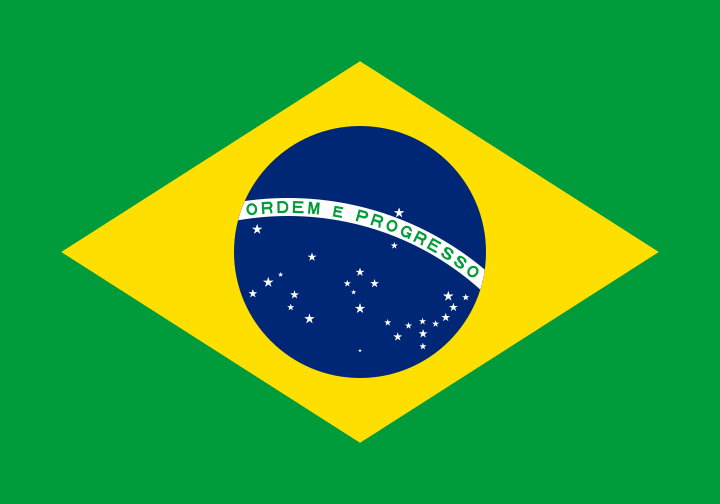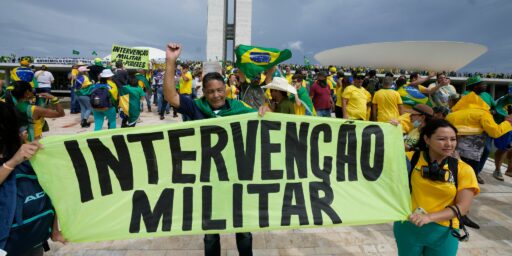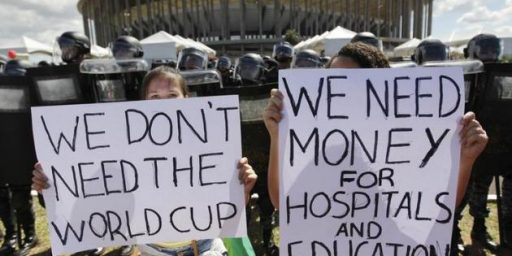Democratic Erosion in Brazil
Part of a disturbing trend.

Via WaPo comes a very dramatic headline: Bolsonaro once said he’d stage a military takeover. Now Brazilians fear he could be laying the foundation for one.
The basics:
In a television interview two decades ago, the fringe congressman didn’t hesitate to say it: If he were president, he would shut down the Brazilian congress and stage a military takeover.
“There’s not even the littlest doubt,” Jair Bolsonaro said. “I’d stage a coup the same day [I became president,] the same day. Congress doesn’t work. I’m sure at least 90 percent of people would party and clap.”
Now the congressman is president of Brazil, and fears are mounting here that he could be considering how to make good on that idea.
Keep in mind some context: Brazil spent a good deal of theTwentieth Century under military rule. Most notably, the military ousted the democratically elected president in 1964 and governed until 1985. The first directly elected post-military government president took office in March of 1990. Military rule is not some distant memory in Brazil.
And, yes, Bolsonaro has, shall we say, a colorful past and a problematic present that sums to more than a small chance that he might attempt a coup. So, it is more than fair to say that he both once threatened one in the past and that people in the now have some cause to be worried he might actually try to stage one in the present.
I have hardly kept up with the minute details of Brazilian politics, although I have certainly keep track of the broad contours of late and my impression is that actually motivating the military to take over again is a low probability scenario. That doesn’t mean, however, that Bolsonaro isn’t bad for Brazilian democracy. He is.
To wit:
“Next year’s elections have to be clean,” he declared this month. “Either we’ll have clean elections, or we won’t have elections.”
[…]
Bolsonaro’s increasingly brazen comments escalate a months-long, Trump-style campaign to erode faith in the electoral system and transform its processes into a high-stakes political struggle. Now, as Latin America’s largest democracy girds itself for what is expected to be a tumultuous election, it confronts a paradox that will be familiar to Americans: The man leading the assault on its electoral process is the very person most recently awarded its highest office.
For years, Bolsonaro has lodged unsubstantiated allegations of electoral fraud. Before the 2018 presidential election, he said the only way he would lose would be by fraud. He then claimed he had won by much more than the official tally showed. Last year, he parroted President Donald Trump’s allegations on the U.S. election: “There was a lot of fraud there.”
But in recent months he has increasingly latched onto Brazil’s electronic voting machines, alleging without evidence that the system is pervaded by fraud. He says the country should switch to physical ballots and has repeatedly pushed the congress to make that change.
It is flatly destructive to issue warnings about fraud without proof. It simply signals to followers that they should be worried about the system and it casts doubt on outcomes and processes in a way that damages public trust. This is cancerous to a democracy.
“Elections are a huge leap of faith, and it’s amazing that we’ve taken them as an article of faith for this long,” said Christopher Sabatini, a senior fellow for Latin America at the London-based think tank Chatham House.
“The genius of electoral fraud claims is that you don’t even need to demonstrate fraud; you just need to demonstrate the possibility of fraud,” Sabatini said. “Then, in the hothouse environment of social media, it will be picked up with very little fact-checking, really catch fire and be reinforced.”
Both the US and Brazil are seeing their institutions attacked in this manner. It is, in some ways, right out of Putin’s version of authoritarianism: just uncut public confidence so that they simply don’t actually expect actual democratic competition and accountability.





“Looks like the Brazilians are all getting their news from something called ‘Notícias da raposa’. Hey, wait a minute…”
I think that the problem is that Bolsonaro is more of a symptom than a root cause, in a country that has problems with it’s institutions, specially the Army, Judiciary and the large state Military Police forces. The Military is talking more or less enigmatically about a coup in part to extract concessions and people are beginning to mock these threats. People fear the state police forces ignoring orders from governors.
Even without a coup that’s not good. In fact, the arrangements that ultimately brought Bolsonaro to power weren’t good. Hell, he was an official in the Army that was caught with plans to put bombs in the equivalent of West Point in Brazil, and he ended in the Presidency.
@Teve: An evangelical megachurch owns the second large broadcast network in Brazil, it’s not much better than Fox. In fact, its probably worse.
https://www.youtube.com/watch?v=_hMXfohgV1w
@Andre Kenji de Sousa: Does democracy work with a consolidated press that sets out to misinform the citizenry? I’d toss in social media that amplifies the insane. When the citizenry is being deluded and lied to, can they make reasonable decisions?
I’m not pro-left-wing-authoritarian-coup (although, if the alternative was a right-wing authoritarian coup, I could be convinced), but around the world democracy is being stressed and tested in ways that show significant weaknesses.
@Gustopher:
Left, right, it doesn’t matter. The country still ends up in the same place and the same atrocities will happen. That one authoritarian will claim to spread the wealth for the people is irrelevant, the experience with authoritarian, socialist states is that they spread the poverty while accruing the wealth to the leadership.
Democracy is under stress, but the solution is in more democracy.
Is Bolsanoro a strong man or is there an ideological / racial component?
I could very well be wrong bit he strikes me as the Orban of of South America.
When is the next election?
@Sleeping Dog: The more important feature of Gustopher’s comment is that it’s not authoritarianism that is the problem; it’s “my side” not being the authority. Gustopher’s just being the snarky crank we all (??) love when he says sh!t like that whereas most people are serious, sad to say.
@Just nutha ignint cracker:
text does irony poorly
@Gustopher:
@Gustopher:
I don’t know. When the Military took over in 1964 they suffocated the two large TV networks that didn’t support the Military Coup, and the country never had a real regime of concessions for radio and TV. The owners of radio and TV can do whatever they want, without taking the
The Megachurch that I mentioned also controls a political party.
@de stijl:
Neither. I would argue that he is more a symptom than a cause and he is far weaker politically than people are willing to admit. I wrote something about Bolsonaro(Next election is next year), by the way:
https://ordinary-times.com/2018/10/26/how-bolsonaro-happens/
https://ordinary-times.com/2021/03/19/with-or-without-lula-bolsonaro-is-toast-in-brazil/